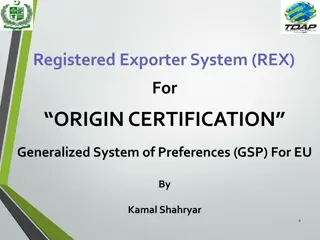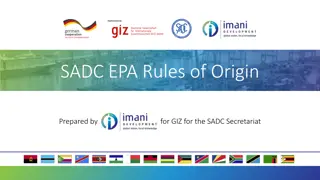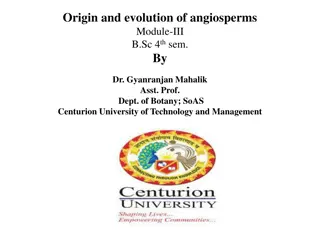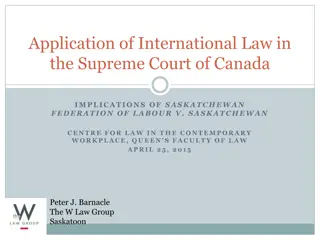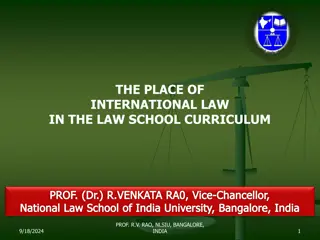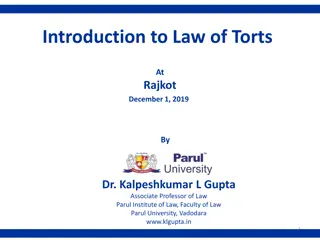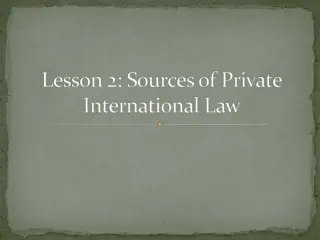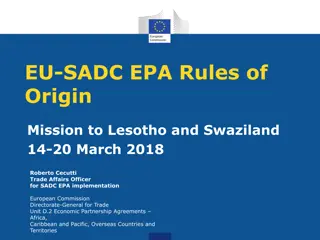Understanding International Law: Origin, Definition, and Application
International law governs relations between independent states and entities, encompassing various fields like armed conflict, human rights, and diplomatic relations. It is a combination of rules and customs, with states as primary subjects. Private international law addresses legal issues with foreign elements. While lacking a centralized legislative body, international law relies on conventions and treaties agreed upon by sovereign states.
Download Presentation

Please find below an Image/Link to download the presentation.
The content on the website is provided AS IS for your information and personal use only. It may not be sold, licensed, or shared on other websites without obtaining consent from the author. Download presentation by click this link. If you encounter any issues during the download, it is possible that the publisher has removed the file from their server.
E N D
Presentation Transcript
International Law History and Nature
INTRODUCTION Where does international law come from and how it is made? National legal systems to the very different context of international law. There is no Code of International Law . International law has no Parliament No international legislation The jurisdiction of international courts and tribunals requires the consent of States.
Definition of International Law In the Lotus case (1926), the Permanent Court of International Justice provided the following definition: International law governs relations between independent states. The rules of law binding upon them therefore emanate from their own will as expressed in conventions established in order to regulate the relations between these co-existing independent communities or with w view to the achievement of common aims.
Definition of International Law Public international law is a combination of rules and customs governing relations between states in different fields, such as armed conflict, human rights, the sea, space, trade, territorial boundaries, and diplomatic relations. The United Nations Charter sets out the fundamental principles of modern public international law, notably: promotion of human rights; the strict limitation on the right to use force against other states; the strict prohibition on the acquisition of territory by force.
Subjects of international law States are the primary subject of international law. However, international law can also regulate the actions of other entities, namely: international organisations, non-state actors (including national liberation movements and individuals), international non-governmental organizations, and multinational companies. All can be defined as subjects of international law, and can be considered as having legal personality. This means that they have both duties and rights provided for by international law.
Private International Law It is a set of rules of the domestic law of a State that is applicable when a legal issue contains a foreign element, and it has to be decided whether a domestic rule should apply foreign law or relinquish jurisdiction to a foreign court. The cases which give rise to the problem concern mostly: divorce, care of children, probate and contract.
The Nature of International law The main argument against the existence of international law as law is that international law does not have any legislature, judiciary or executive within the usual understanding of these terms, responsible for creation, interpretation and enforcement of that law.
The Nature of International law The most convincing argument in favour of existence of international law as law is that States recognise and observe international law with the consequence that there is substantial order in international relations and that international law is practised on daily basis by international lawyers, intergovernmental organisations and other non-state actors and applied by domestic and international courts.
International law and municipal law Public international law leaves each country to decide on relationship between international law and municipal law. In this respect, there are two theories: dualist and monist.
International law and municipal law Dualism The dualist doctrine considers international law and municipal law as two independent and separate systems. It is based on the view that international law is the law applicable between the sovereign States and the municipal law applies within the State to regulate the activities of its citizens. In order to be applied by national courts it is necessary for the treaty to be incorporated into a State s legal system. The incorporation of international law by municipal law constitutes the most important feature of the dualist doctrine.
International law and municipal law Monism Monism considers both international and municipal law to be part of the same legal order and emphasises the supremacy of international law even within the municipal sphere. According to Kelsen international law is supreme because it is a higher law than municipal law. Under this theory the unity between international law and municipal law means that international treaties automatically become law within a contracting State. They are directly applicable. There is no need for incorporation of an international treaty as it becomes an integral part of the national law of a State once the procedure for its ratification is completed.
International law and municipal law The general rule is that in the even of conflict between international and municipal law, the international prevails. The Draft Declaration on Rights and Duties of States (1949) in its Article 13 states that: Every State has the duty to carry out in good faith its obligations arising from treaties and other sources of international law, and it may not invoke provisions in its constitutions or its laws as an excuse not to perform this duty.
International law and municipal law In respect of international treaties, Article 27 Vienna Convention on the law of Treaties (VCLT) states: A party may not invoke the provisions of its internal law as justification for its failure to perform a treaty. A State cannot rely upon the provisions or deficiencies of its municipal law to avoid its obligations under international law.
Enforcement of International Law Methods of enforcement of international law differ from those available under municipal law because international law does not have all the attributes of municipal law i.e. there is no legislature, judiciary or executive. A State obeys international law because: a) It want to maintain its good reputation; b) It fears retaliatory measures or measures based on reciprocity that may be taken by a victim State;
Enforcement of International Law c) The UN Security Council (UNSC) may take various of measures, including the use of force under Chapter VII of the UN Charter to force a State to comply with international law; d) It is bound under many international treaties to accept the compulsory jurisdiction and the judgements of a body established by a treaty to deal with disputes arising out of it; e) It fears public opinion both home and abroad.
Enforcement of International Law Measures may be taken against a State: a) non-forcible measures: diplomatic sanctions, economic and other sanctions not involving the use of force; b) forcible measures: the UNSC under Article 42 of the UN Charter may authorise the use of force against a State. Measures may be taken against a person: may be brought before the International Criminal Court (ICC) or other international criminal courts; the UNSC may impose sanctions against a person or an identified group of persons; a State may impose sanctions such as confiscation of assets, fines and imprisonment on a person.
Sanctions in International law In legal jargon the term sanctions is equally used to designate restrictive measures that an individual State or international organization chooses to take against another State or organisation. In this broad acceptation the word sanctions designates all types of consequences triggered by the violation of an international legal rule. These consequences range from a series of soft, and social reactions, such as pressures from public opinion, and name-and-shame politics, to a variety of organized effects attached to the non-respect of a legal rule.
Sanctions in International law Chapter VII envisages two categories of enforcement measures: Art. 41 covers measures not involving the use of armed force , while Art. 42 authorizes the Security Council to use the coercive military force to maintain or restore international peace and security . The two mechanisms: whereas the economic sanctions of Art. 41 are intended to coexist with similar unilateral measures taken by States (or other international organizations), the measures of Art. 42 come within the exclusive competence of the Security Council. They are a substitute for the unilateral use of force.
Economic Sanctions Article 41 then provides that: The Security Council may decide what measures not involving the use of armed force are to be employed to give effect to its decisions, and it may call upon the Members of the United Nations to apply such measures. They may include complete or partial interruption of economic relations and of rail, sea, air, postal, telegraphic, radio, and other means of communication, and the severance of diplomatic relations .
Economic Sanctions Sanctions take a variety of forms, including travel bans, asset freezes, arms embargoes, capital restraints, foreign aid reductions, and trade restrictions.
Jus cogens There is no formal hierarchy within IL as a whole, there are some hierarchical elements. One of them is jus cogens, a legal category that can be found in the Vienna Convention on the Law of Treaties (VCLT). Jus cogens (from Latin: compelling law; from English: peremptory norm) refers to certain fundamental, overriding principles of international law.
Jus cogens Article 53 Vienna Convention on the law of treaties, defines a peremptory norm as a norm accepted and recognized by the international community of States as a whole as a norm from which no derogation is permitted and which can be modified only by a subsequent norm of general international law having the same character. A treaty is void if, at the time of its conclusion, it conflicts with a peremptory norm of general international law. Jus cogens overrides conflicting norms, creates normative hierarchy.
Jus cogens Prohibition of aggression, slavery, genocide, racial discrimination, crimes against humanity, torture, the right to self- determination, basic rules of international humanitarian law, prohibition of piracy.
Article 103 of the UN Charter In the event of a conflict between the obligations of the Members of the United Nations under the present Charter and their obligations under any other international agreement, their obligations under the present Charter shall prevail.
Fundamental principles governing International Relations Principles are intend to serve as a basic guidelines for the life of the whole international community. They may be regarded as the constitutional principles of international community. The sovereign equality of States; non- intervention in the internal or external affairs of other States; prohibition of the treat or use of force; respect for human rights.
Fundamental principles governing International Relations Peaceful settlement of disputes. The UN Charter in Article 2(3) obliges member States to settle their international disputes peacefully. They must try the various means and procedures laid down there: negotiation, mediation, conciliation, resort to arbitral or judicial mechanism. While trying to settle the dispute peacefully, States are obliges to refrain any action which may aggravate the situation so as to endanger the maintenance of international peace and security.
Specialist areas of International Law The International Law of the Sea. International Trade Law. International Environmental Law. International Humanitarian Law. International Human Rights Law. International Criminal Law.
Aide-mmoire: key dates in the development of international law 1648. The conclusion of the treaty of Westphalia, which ended religious wars in Europe, is often referred to as the constitutional treaty of Europe. It recognised the principle of sovereignty, territorial integrity, the equality of States, and recognised that a ruler has the right to impose his chosen religion on his subjects although some protection was guaranteed for religious minorities.
Aide-mmoire: key dates in the development of international law 1815. The Congress of Vienna which ended the Napoleonic wars established a new political balance of powers intended to ensure stability, peace and the status quo in Europe. It was based on sovereignty, balance of powers, legitimacy, and equality between nations. It codified the law on diplomatic agents and missions, created the institution of permanent neutrality (e.g. in respect of Switzerland) and created the Concert of Europe, as means of enforcing its decisions.
Aide-mmoire: key dates in the development of international law 1919. The League of Nations and the permanent Court of International justice (PCIJ) were established under the auspices of the 1919 Peace Conference. The League of Nations was the first universal intergovernmental organisation open to any State. Its main objectives were to maintain peace and security, protect minorities and supervise the mandate system. The PCIJ was the first permanent world court ever created by the international community open to all states with jurisdiction over all international disputes.
Aide-mmoire: key dates in the development of international law 1945. The creation of the United Nations (UN). The purposes of the UN are: to maintain international peace and security; to develop friendly relations among nations; to achieve international co-operation in solving common international problems of an economic, social, cultural or humanitarian nature; to be a centre for harmonising the actions of nations in the attainment of these common ends.
Aide-mmoire: key dates in the development of international law 1989-1991. The period from the fall of the Berlin Wall (7 November 1989) to the official dissolution of the Soviet Union (31 December 1991) is considered as the end of the Cold War.
International Law Commission Studies topics for possible codification, such as: State responsibility, Law of Treaties, Regime of territorial waters, etc.
Summary International law comprises a system of rules and principles that govern the international relations between sovereign States and other institutional subjects of international law. It operates alongside international diplomacy, politics and economics. The international law is a system of law, that its subjects recognise that there exists a set of rules binding upon them as law. Subjects believe international law exists.
Summary It is a Law of Co-ordination, which main objective is to keep its subjects peacefully apart and to organize unilateral or common action where an issue cannot be managed effectively by each subject alone. The basic presumption of the law of coordination is that all subjects are equally sovereign. States are the dominant actors in international relations. This system is based upon the assumption that what is not prohibited is permitted.
Summary It is the Law of Co-operation. The obligation to co- operate, as set out in Art. 1 (1) and (3) UN Charter, entails co-operation among States, and co-operation with the UN in the maintenance of international peace and security, as well as in the solving of international problems of an economic, social, cultural, or humanitarian character. The duty to co-operate means the obligation to enter into such co-ordinated action so as to achieve a specific goal.
Summary The Legitimacy of International Law: it rests in the consent of their subjects. It is not a perfect system. There is a general lack of institutions; the content of the rules can be uncertain; States may elect to ignore international law when their vital interests are at stake; States are able to violate basic rules, such as prohibition of violence without fear of being coerced.
Business ethics Accepted principles about business what is right and wrong for business and these principles generally accepted by all business community and these principles govern the conduct of business people and firms.
Ethical issues in I.B Employment practices Environme ntal pollution Human rights Other Obligation s Corruption
Employment practices Take work from employees according their compensation, age, gender and ability. Examples of those companies who faces this unethical behavior: Nike 1996 Levi Strauss(levi s) What standards should be applied?
Human rights Freedom of association, speech, movement and freedom from political repression. Example of mandated segregation of whites & non-whites in South Africa.(till 1994) Rules of Sullivan that adopted by GM: Company should not obey the apartheid laws. Company do every thing to promote the abolition of apartheid laws.
Human rights (continued) After 10years Leon Sullivan found that these principles are not sufficient and he force the multinational companies operation and put an economic pressure on South Africa. Investment in non democratic countries and make their living standard developments put pressure on country. Royal Dutch/Shell in Nigeria (Early 1990 s) to diverse their better. These
Environmental pollution Royal Dutch/Shell in Nigeria (Early 1990 s) Should a company pollute the environment to gain an economical/competitive advantage?
Environmental pollution (continued) When individuals overuse a resource held in common by all, but owned by no one, resulting in degradation. This phenomenon is called Garrett Hardin. Problem of pasture in England
Corruption Siemens bribery scandal(German company) Carl Kotchian(president of Lockheed) made 12.5m payment to Japanese govt. to secure their contract. Foreign corrupt act 1977 Organization for economic development(OECD) adopted combating bribery of foreign public officials in I.B transaction in 1999. cooperation convention & on
Other obligations Corporate social responsibilities (CSR) Example of multinational company who negatively use their powers: British East India company(1600-19thcentury) Example of CSR companies: British petroleum
Ethical Dilemmas Ethical dilemmas are situations in which none of the available alternatives acceptable. The ethical obligations corporation toward employment human rights, corruption, pollution, and the use of power are not always clear cut. seems ethically of a multinational conditions, environmental
Your opinion What you do in a situation where you have 14year old employee and his family has no other food winner & it is not ethical to keep a child labor. In this situation what action is ethical, Replace him or keep him?
Roots of ethical/unethical behavior Perso nal ethics Unrealisti c performan ce goals Decisio n making process Roots Organiza tional culture Leaders hip
Personal ethics Business ethics are not divorced from personal ethics, which are the principles of right and wrong governing the conduct of individuals. As individuals, we are typically taught that it is wrong to lie and cheat, it is unethical and that it is right to behave with integrity and honor, and to stand up for what we believe to be right and true. generally accepted



